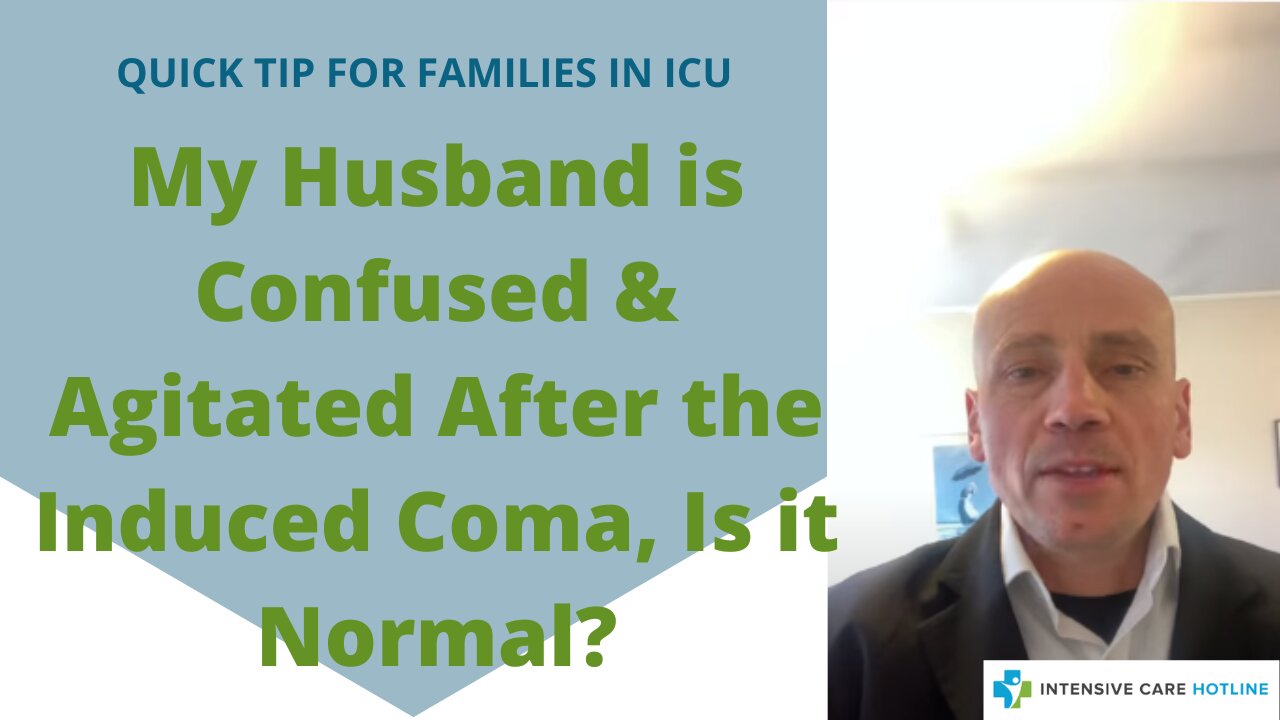Premium Only Content

Quick tip for families in ICU: My Husband is Confused&Agitated After the Induced Coma, Is it Normal?
Quick tip for families in ICU: My husband is confused and agitated after the induced coma, is this normal?
Book your free 15 minute phone consultation here
http://intensivecarehotline.com/scheduling-appointment/
Call directly 24/7
+1 415-915-0090 USA/Canada
+44 118 324 3018 UK
+6141 094 2230 Australia
Email support@intensivecarehotline.com
Get 1:1 consulting and advocacy
1:1 phone counselling
http://intensivecarehotline.com/one-on-one-counselling/
Become a member for families of critically ill Patients in Intensive Care
https://intensivecarehotline.com/intensivecaresupport-org-membership/
Immediate action steps http://intensivecarehotline.com/take-control-take-charge/immediate-action-steps/
https://intensivecareathome.com
And if you need a medical record review , click on the link and we can help you with reviewing your loved one’s medical records while they’re in ICU.
https://intensivecarehotline.thrivecart.com/review-of-medical-records/
Hi, it’s Patrik Hutzel from intensivecarehotline.com with another quick tip for families in intensive care.
So, I’ve had Sarah write in and Sarah says, “My husband has been in an induced coma for seven days in intensive care. And he’s now out of the induced coma. He’s extubated. He’s off the ventilator, has the breathing tube out, but he’s now confused. And I am very confused by seeing this and I don’t know what to make out of it. What should I expect going forward? How long will this last? Will he ever come out of it? It’s been a couple of days now, but he seems to be very confused, aggressive, combative, even at times. And it’s not nice to watch because my husband usually is not like this at all. He’s usually very calm and he’s just not himself at all.”
What a great question, Sarah! When patients come out of an induced coma in intensive care, it really depends on, how long have they been in an induced coma? What medications have they been on? How are they reacting to the medications? And so forth.
Some patients come out of an induced coma and they’re oriented. They have purposeful speech, purposeful movements, everything makes sense of what they’re doing, what they’re saying, and so forth. And then, there are other patients that can be confused, agitated, even combative, and aggressive. They can also be pleasantly confused. I’ve seen all of it after having worked in intensive care for over 20 years. And after having looked after thousands of critically ill patients in intensive care. So, I can totally understand what you’re witnessing there at the moment and that it’s not very nice to watch.
So again, picture this, your husband, would’ve been in an induced coma for a week. He would’ve had a lot of sedative medications such as propofol or midazolam, also known as Versed or Precedex. He would’ve had some morphine, and some fentanyl. Some pretty strong and potent stuff. And now, he’s going to be weaned off some of that or all of that. Some of those medications that I just mentioned are addictive in nature. Which means he might be going through withdrawal from those drugs that might be contributing to the confusion and agitation. So you got to ask the intensive care team, whether he’s potentially withdrawing from some of the medications that he’s had whilst he was in the induced coma.
Now, next you got to rule out a neurological event. They have to rule out something like a stroke or whether he’s got any seizures, because at the end of the day, you don’t know what happened in those seven days while he was in an induced coma, whilst he couldn’t really communicate with the outside world. Whether he might have had a neurological event such as a stroke. They should be able to rule that out by a CT (computed tomography) of the brain, by an MRI (magnetic resonance imaging) scan of the brain or with an EEG (electroencephalogram). So, how does this subside? It usually subsides over time.
A lot of patients leave intensive care, they’re physically better and they’re physically at the point where they can leave intensive care, but they might still be confused, aggressive, combative, whatever you want to call it. And then eventually once they’re back to more “normality” on a hospital floor, or on a hospital ward, that’s when usually things turn around slowly. But it might take a few days, just be patient and get back to a routine, get back to him, walking around if he can, or having a shower. Just feeling like a human that can often make all the difference in the world.
Just getting back to some natural daylight, maybe he was in a room in ICU with no natural daylight.
-
 0:53
0:53
Intensive Care Hotline
2 days agoAmerican Journal of Medicine Confirmed: Nasogastric Tubes are Safer Than PEG Tubes
71 -
 9:34:03
9:34:03
FusedAegisTV
15 hours agoMario Galaxy, Batman, Real Talk/Politics, & MORE - V-Day 💗 Friday Variety Stream!
10.6K -
 1:10:49
1:10:49
Vigilant News Network
3 hours agoRFK Jr. Drops a Stunning Announcement | The Daily Dose
22.7K14 -
 49:49
49:49
Candace Show Podcast
6 hours agoEXCLUSIVE: Blake & Ryan’s Desperate Legal Strategy Exposed! | Candace Ep 147
137K115 -
 1:32:20
1:32:20
2 MIKES LIVE
4 hours ago2 MIKES LIVE #180 with guest Kyle Rittenhouse!
23.1K2 -
 9:40
9:40
Tactical Advisor
9 hours agoBest Home Defense Shotgun Build | Genesis Gen 12
22.2K -
 56:44
56:44
VSiNLive
6 hours ago $3.15 earnedFollow the Money with Mitch Moss & Pauly Howard | Hour 1
52.7K1 -
 1:05:48
1:05:48
The Amber May Show
9 hours ago $2.11 earnedBig Balls | You Know It's Bad When Legacy Media Reports On Big Balls | Sam Anthony
26.1K6 -
 LIVE
LIVE
SoniCentric
1 day agoEnjoy a COZY Valentine's Day Escape to Paris with the BEST blend of Romantic Music
96 watching -
 1:59:52
1:59:52
Revenge of the Cis
7 hours agoEpisode 1447: Love Train
54.9K7